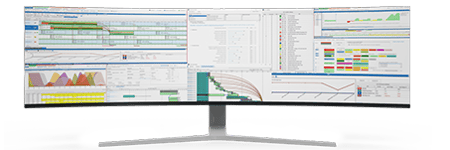
Planning for Pharmaceutical Supply Chain Expansion: Strategies for Success
Pharmaceutical manufacturing is experiencing an era of transformation, fueled by advancements in technology, the expansion of global markets, and increasing regulatory demands. For Supply Chain Managers in this industry, planning for supply chain expansion is both a challenge and an opportunity to streamline operations, reduce costs, and improve patient outcomes.
Leveraging advanced tools like PlanetTogether integrated with enterprise systems such as SAP, Oracle, Microsoft, Kinaxis, or Aveva, can be a game-changer in achieving these objectives.

Understanding the Need for Supply Chain Expansion
The pharmaceutical industry faces unique challenges:
Globalization of Markets: As demand grows in emerging markets, supply chain networks must adapt to ensure timely and efficient delivery.
Regulatory Compliance: Meeting stringent compliance standards across regions adds complexity to supply chain operations.
Product Complexity: With an increase in biologics, personalized medicine, and combination therapies, the supply chain must be more agile and precise.
Resilience and Risk Mitigation: Events like the COVID-19 pandemic have underscored the importance of robust, flexible supply chains.
Expanding a pharmaceutical supply chain involves addressing these factors while maintaining operational efficiency. Effective planning, supported by the right technology, can simplify this process.


The Role of PlanetTogether in the Expansion Journey
PlanetTogether stands out as a critical enabler in the pharmaceutical supply chain expansion journey. Its advanced scheduling and planning capabilities, when integrated with systems like SAP, Oracle, Microsoft, Kinaxis, or Aveva, ensure:
Enhanced Collaboration: Break down silos and foster collaboration across departments and supply chain stakeholders.
Real-Time Insights: Access actionable data for informed decision-making.
Operational Agility: Quickly adapt to market changes and disruptions.
Sustainability Goals: Optimize resources and reduce waste, contributing to environmental sustainability.

Key Strategies for Supply Chain Expansion
Data-Driven Decision Making
Reliable data is the cornerstone of an efficient supply chain. Integrating PlanetTogether with systems like SAP or Microsoft Dynamics enables real-time visibility into operations, inventory levels, and production schedules. This integration facilitates predictive analytics, allowing Supply Chain Managers to anticipate demand surges and make proactive adjustments.
Optimizing Production Planning
Supply chain expansion often necessitates increased production capacity. Advanced planning and scheduling (APS) tools, such as PlanetTogether, provide comprehensive visibility into manufacturing constraints. When integrated with ERP systems like Oracle or Kinaxis, these tools optimize production sequences, minimize bottlenecks, and align manufacturing timelines with supply chain goals.
Enhancing Supplier Collaboration
An expanded supply chain typically involves a broader network of suppliers. Using a platform like PlanetTogether integrated with Aveva’s industrial solutions ensures seamless communication and collaboration with suppliers. Such integration provides a unified view of supply chain operations, helping to manage lead times, ensure quality, and mitigate disruptions.
Strengthening Inventory Management
Expanding supply chains can lead to inventory imbalances, such as overstocking or stockouts. Leveraging PlanetTogether alongside SAP or Microsoft solutions allows Supply Chain Managers to implement just-in-time (JIT) inventory strategies, ensuring optimal stock levels while reducing holding costs.
Prioritizing Scalability and Flexibility
Expansion plans must account for future growth and unforeseen market shifts. Tools like PlanetTogether, when combined with Kinaxis’ RapidResponse platform, enhance scenario planning capabilities. This integration enables businesses to evaluate various expansion scenarios, assess risks, and implement scalable solutions.

Integration as a Catalyst for Expansion
Technology integration is critical for seamless supply chain expansion. Here’s how combining PlanetTogether with leading enterprise systems drives success:
SAP Integration: Combining PlanetTogether’s APS capabilities with SAP’s ERP ensures end-to-end visibility, from production planning to delivery. This integration helps optimize workflows, reduce cycle times, and improve resource utilization.
Oracle Integration: By integrating PlanetTogether with Oracle’s supply chain solutions, businesses can leverage advanced analytics for enhanced demand forecasting and inventory optimization.
Microsoft Dynamics Integration: PlanetTogether’s scheduling tools, paired with Microsoft’s ERP and CRM systems, improve operational efficiency and foster better customer relationships through timely deliveries.
Kinaxis Integration: PlanetTogether and Kinaxis provide a robust framework for supply chain synchronization, enabling real-time monitoring and dynamic response to market changes.
Aveva Integration: PlanetTogether’s integration with Aveva’s industrial software ensures smooth coordination between manufacturing and supply chain operations, particularly in facilities embracing Industry 4.0 technologies.
Planning for pharmaceutical supply chain expansion is a complex but rewarding endeavor. By leveraging advanced technologies like PlanetTogether and integrating them with industry-leading enterprise systems, Supply Chain Managers can streamline operations, enhance collaboration, and achieve scalability. As the pharmaceutical landscape evolves, adopting these strategies will ensure your supply chain remains resilient, efficient, and capable of meeting global demand.
Are you ready to take your manufacturing operations to the next level? Contact us today to learn more about how PlanetTogether can help you achieve your goals and drive success in your industry.

























LEAVE A COMMENT